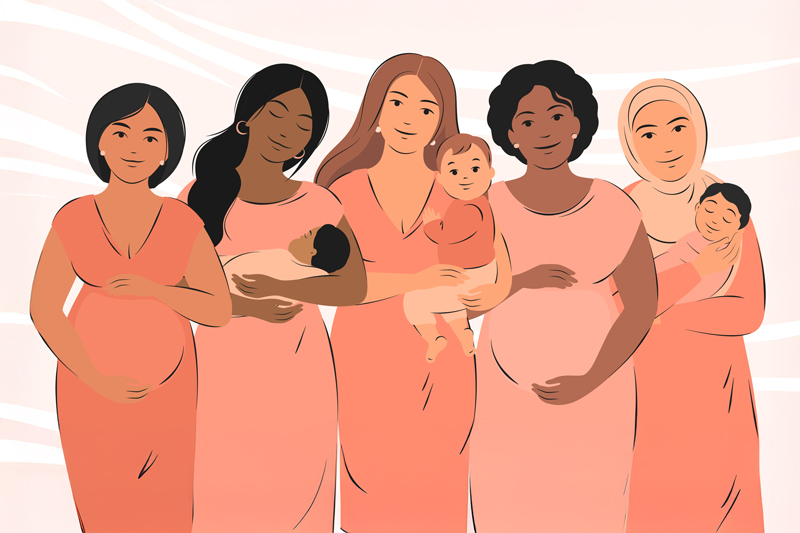Perinatal mental health—the emotional and psychological well-being of individuals during pregnancy and the postpartum period—is a growing public health concern. In New York City, behavioral health conditions are among the leading underlying causes of pregnancy-related deaths.

According to the NYC Maternal Mortality Review Committee (MMRC), mental health conditions (defined as including overdose and suicide) accounted for 18.7% of pregnancy-associated deaths in NYC from 2016-2020 (Pregnancy-Associated Mortality in New York City, 2016-2020). Of these deaths, overdose accounted for 75.6% of pregnancy-associated deaths, with more than 76% involving opioids. This underscores the urgent need for early identification, intervention, and treatment of perinatal mental health and substance use disorders.
To address some of these challenges, the NYC Department of Health and Mental Hygiene is expanding access to perinatal mental health care through its Perinatal + Early Childhood Mental Health (P+ECMH) Network clinics and its Training and Technical Assistance Center (TTAC). These efforts aim to improve early support for parents and reduce health disparities, building upon broader initiatives like New York City’s HealthyNYC campaign, which targets reducing drug overdose, suicide, and maternal mortality.
Prioritizing Health Equity in Perinatal Mental Health Services
Too often, racial and socioeconomic disparities shape who receives care (Krishnamoorthi et al., 2023). Black and Latina women and birthing people are more likely to experience higher rates of perinatal mood and anxiety disorders but are less likely to receive adequate treatment (Kozhimannil et al., 2011). The Health Department’s expanded services aim to change that by focusing on four key strategies:
- Expanding Outpatient Clinics – Additional perinatal mental health supports are being integrated into outpatient clinics across all five boroughs through the NYC P + ECHM Network. These clinics will provide culturally competent and linguistically inclusive care to ensure accessibility for pregnant and parenting people and their partners.
- Increasing Workforce Training – Through the TTAC perinatal expansion, the Health Department is funding more training and technical assistance to mental health practitioners and perinatal partners across disciplines. This initiative emphasizes culturally responsive care, trauma- and resilience-informed approaches, and best practices for addressing perinatal mental health conditions, including co-occurring substance use disorders among diverse populations.
- Strengthening Community-Based Support – Enhancing peer support groups, home visiting programs, and collaboration with doulas aims to improve engagement and reduce stigma. These community-driven models offer meaningful and accessible support, particularly to historically underserved populations, by fostering a sense of connection and trust.
- Addressing Structural Barriers – While not the central focus of this initiative, the Health Department continues to support broader advocacy and policy efforts that enhance access to care, such as expanded Medicaid coverage and workforce capacity building. Reducing systemic barriers and ensuring equitable access to mental health support remain key goals across various health initiatives in NYC.
Strengthening Collaborations for Comprehensive and Coordinated Care
A robust referral system is at the heart of our collaborative approach. Families in need of mental health care must be linked to care. This initiative enhances capacity and coordination among existing NYC Health Department programs serving pregnant people and new families, including the Newborn Home Visiting Program, Nurse-Family Partnership, Citywide Doula Initiative; Family Wellness Suites; Healthy Start Brooklyn; Healthy Women, Healthy Futures; and the Neighborhood Health Action Centers. These programs center on education, empowerment, and culturally responsive services for birthing communities. They are supported by an interdisciplinary team of public health professionals, which may include doulas, social workers, nurses, and health educators who provide timely, critical care to families throughout the perinatal period. Home visitors and doulas are being trained to recognize, screen for, and refer individuals requiring mental health attention to care. Social workers are being trained in evidence-based short-term interventions they can deliver directly to families in need. By strengthening these internal linkages, the Health Department is creating a comprehensive network of care that wraps around birthing families and addresses their needs.
In recognition of the incredible diversity of our community, the Perinatal + Early Childhood Mental Health (P+ECMH) Network is prioritizing equity-focused and evidence-based workforce development. The Network is intensifying training focused on perinatal mental health and substance use through its P+ECMH Training and Technical Assistance Center (TTAC). This initiative equips mental health practitioners, community health workers, nurses, doulas, and lactation counselors with the knowledge and skills needed to recognize and respond to mental health and substance use needs in an evidence-informed and culturally appropriate way. Together, these efforts are creating an inclusive and supportive ecosystem for families navigating the perinatal period by equipping NYC’s workforce with the tools needed to meet them where they are with respect, empathy, and care.
The Goals of the Expansion
By increasing access to perinatal mental health services and centering health equity, this initiative seeks to:
- Reduce the incidence of untreated perinatal depression and anxiety, particularly among communities of color
- Strengthen parent-infant bonding and overall family well-being
- Improve developmental and emotional outcomes for young children
- Address racial disparities in access to maternal mental health supports
- Build a more resilient and well-trained behavioral health workforce equipped to provide inclusive and equitable care
Conclusion
Perinatal mental health is an essential component of overall maternal and child well-being. The expansion of NYC’s Perinatal + Early Childhood Mental Health Network and TTAC’s enhanced training efforts mark a critical investment in the future of families, particularly those most impacted by systemic inequalities. By aligning with MMRC recommendations and addressing racial and socioeconomic disparities through early intervention, workforce development, and policy advocacy, this initiative is poised to create lasting positive change for parents and children across the city.
By expanding services, empowering practitioners, and centering equity, NYC’s Perinatal + Early Childhood Mental Health Network clinics, and TTAC are working toward a future where every parent is seen, heard, and supported. When we invest in parents, we uplift entire families—and build a healthier and more equitable New York for all.
Fatima Kadik, MA, is the Director, and Devina Buckshee, MA, MPH, is the Evaluation Specialist for the Perinatal and Early Childhood Mental Health Programs at the New York City Department of Health and Mental Hygiene.
For more information on the NYC Perinatal + Early Childhood Mental Health Network and the TTAC training, please visit ttacny.org. For more information about the NYC Department of Health and Mental Hygiene, please visit https://www.nyc.gov/site/doh/index.page.
References
American College of Obstetricians and Gynecologists. (2023). Maternal Mental Health: The Role of Obstetrician-Gynecologists. Retrieved from https://www.acog.org
Centers for Disease Control and Prevention (CDC). (2022). Maternal Mortality Review Committees Report on Pregnancy-Related Deaths. Retrieved from https://www.cdc.gov/maternal-mortality/php/report/index.html
Centers for Disease Control and Prevention. (2022). Maternal Mental Health Conditions: MMRC Findings. Retrieved from https://www.cdc.gov/reproductivehealth/maternal-mortality/pmad-mmrc.html
Kozhimannil, K. B., Trinacty, C. M., Busch, A. B., Huskamp, H. A., & Adams, A. S. (2011). Racial and ethnic disparities in postpartum depression care among low-income women. Psychiatric Services, 62(6), 619–625. https://doi.org/10.1176/ps.62.6.pss6206_0619
Krishnamoorthi M, Balbierz A, Laraque-Arena D, Howell EA. Addressing the National Crisis Facing Black and Latina Women, Birthing People, and Infants: The Maternal and Child Health Equity Summit. Obstet Gynecol. 2023 Mar 1;141(3):467-472. doi: 10.1097/AOG.0000000000005067. Epub 2023 Feb 2. PMID: 36735384; PMCID: PMC9974748.
Montalmant, K.E., Ettinger, A.K. The Racial Disparities in Maternal Mortality and Impact of Structural Racism and Implicit Racial Bias on Pregnant Black Women: A Review of the Literature. J. Racial and Ethnic Health Disparities 11, 3658–3677 (2024). https://doi.org/10.1007/s40615-023-01816-x
NYC Department of Health and Mental Hygiene (DOHMH). (2023). Pregnancy-Associated Mortality: New York City, 2016–2020. Retrieved from https://www.nyc.gov/assets/doh/downloads/pdf/ms/pregnancy-associated-mortality-report-2016-2020.pdf
NYC Department of Health and Mental Hygiene (DOHMH). (2024). Health Alert #31: Pregnancy-Associated Deaths Involving Overdose. Retrieved from https://www.nyc.gov/assets/doh/downloads/pdf/han/advisory/2024/han-advisory-31.pdf
NYC Department of Health and Mental Hygiene. (2023). Expanding Perinatal Mental Health Services: Addressing Health Equity. Retrieved from https://www.nyc.gov/health
Taylor, J., Novoa, C., Hamm, K., & Phadke, S. (2019). Eliminating Racial Disparities in Maternal and Infant Mortality: A Comprehensive Policy Blueprint. Center for American Progress. Retrieved from https://www.americanprogress.org





